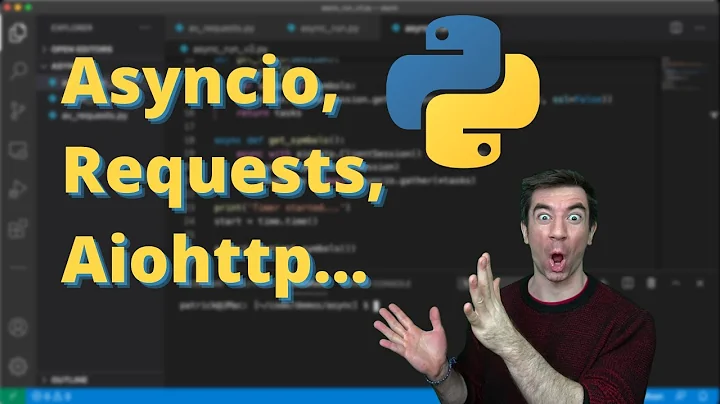What does asyncio.create_task() do?
What does
asyncio.create_task()do?
It submits the coroutine to run "in the background", i.e. concurrently with the current task and all other tasks, switching between them at await points. It returns an awaitable handle called a "task" which you can also use to cancel the execution of the coroutine.
It's one of the central primitives of asyncio, the asyncio equivalent of starting a thread. (In the same analogy, awaiting the task with await is the equivalent of joining a thread.)
Shouldn't the
slow_tasknot be able to run until the completion of thefast_coro
No, because you explicitly used create_task to start slow_task in the background. Had you written something like:
slow_coro = counter_loop("Slow", 4)
fast_coro = counter_loop("Fast", 2)
fast_val = await fast_coro
...indeed slow_coro would not run because no one would have yet submitted it to the event loop. But create_task does exactly that: submit it to the event loop for execution concurrently with other tasks, the point of switching being any await.
because it was never used in an
asyncio.gathermethod?
asyncio.gather is not the only way to achieve concurrency in asyncio. It's just a utility function that makes it easier to wait for a number of coroutines to all complete, and submit them to the event loop at the same time. create_task does just the submitting, it should have probably been called start_coroutine or something like that.
Why do we have to await
slow_task?
We don't have to, it just serves to wait for both coroutines to finish cleanly. The code could have also awaited asyncio.sleep() or something like that. Returning from main() (and the event loop) immediately with some tasks still pending would have worked as well, but it would have printed a warning message indicating a possible bug. Awaiting (or canceling) the task before stopping the event loop is just cleaner.
What really is a task?
It's an asyncio construct that tracks execution of a coroutine in a concrete event loop. When you call create_task, you submit a coroutine for execution and receive back a handle. You can await this handle when you actually need the result, or you can never await it, if you don't care about the result. This handle is the task, and it inherits from Future, which makes it awaitable and also provides the lower-level callback-based interface, such as add_done_callback.
Related videos on Youtube
BeastCoder
I am a hobbyist who enjoys all things coding. Recommended Books: Automate the Boring Stuff With Python
Updated on September 13, 2021Comments
-
BeastCoder over 2 years
What does
asyncio.create_task()do? I have looked at the docs and can't seem to understand it. A bit of code that confuses me is this:import asyncio async def counter_loop(x, n): for i in range(1, n + 1): print(f"Counter {x}: {i}") await asyncio.sleep(0.5) return f"Finished {x} in {n}" async def main(): slow_task = asyncio.create_task(counter_loop("Slow", 4)) fast_coro = counter_loop("Fast", 2) print("Awaiting Fast") fast_val = await fast_coro print("Finished Fast") print("Awaiting Slow") slow_val = await slow_task print("Finished Slow") print(f"{fast_val}, {slow_val}") asyncio.run(main())This gives the following output:
001 | Awaiting Fast 002 | Counter Fast: 1 003 | Counter Slow: 1 004 | Counter Fast: 2 005 | Counter Slow: 2 006 | Finished Fast 007 | Awaiting Slow 008 | Counter Slow: 3 009 | Counter Slow: 4 010 | Finished Slow 011 | Finished Fast in 2, Finished Slow in 4I don't understand quite how this is working.
- Shouldn't the
slow_tasknot be able to run until the completion of thefast_corobecause it was never used in anasyncio.gathermethod? - Why do we have to
await slow_task? - Why is
Awaiting Slowprinted after the coroutine appears to have started? - What really is a task? I know that what
gatheris doing is scheduling a task. Andcreate_tasksupposedly creates a task.
An in-depth answer would be greatly appreciated. Thanks!
It also might be worth mentioning that I know very little about Futures.
-
 Pynchia almost 4 yearsAs the log shows, a task is executed immediately
Pynchia almost 4 yearsAs the log shows, a task is executed immediately
- Shouldn't the
-
BeastCoder almost 4 yearsThanks! I have just two follow up questions.
-
BeastCoder almost 4 years1. What would happen if you did
asyncio.gather(list_of_tasks)? 2. Doescreate_taskreturn the results of whatever is running? Or would the only way to get the return statements be to use await and hope that it hadn't finished in the background? 3. Gather also converts all coroutines into tasks, right? But, it waits for them to finish. -
user4815162342 almost 4 years@BeastCoder
asyncio.gather(*list_of_tasks)would wait for the tasks to finish and return the result of their respective coroutines.create_taskreturns a task, which you canawaitto get the result of whatever is (was) running. If it had already finished, don't worry, it'll keep the result anyway. Yes,gathercallscreate_taskif needed for your convenience - this is because it supports awaitables other than coroutines. -
BeastCoder almost 4 yearsAh, thanks for clearing that up. And,
gatherbehind the scenes is basically creating these tasks and then awaiting them? -
user4815162342 almost 4 years@BeastCoder Pretty much, yes. Something like
tasks = [asyncio.create_task(c) for c in list_of_coros]; results = [await t for t in tasks]would be a good first approximation of whatgatherdoes. The implementation is much more complex, however, becausegatheris very careful about how it propagates exceptions, how it responds to cancelation, as well as various other concerns. -
 Arnab Mukherjee over 3 yearsOne question: when you said create tasks executes coroutines in parallel or concurrent execution? Can you elaborate on it. Does it execute in separate thread ?
Arnab Mukherjee over 3 yearsOne question: when you said create tasks executes coroutines in parallel or concurrent execution? Can you elaborate on it. Does it execute in separate thread ? -
user4815162342 over 3 years@ArnabMukherjee It executes in the same thread, so I guess it would be concurrent rather than truly parallel.
-
 Arnab Mukherjee over 3 years@user4815162342 so what ever tasks we wrap with create_task it will executed in background. We can await and check the results if we want. What is the role of event loop in the tasks ?
Arnab Mukherjee over 3 years@user4815162342 so what ever tasks we wrap with create_task it will executed in background. We can await and check the results if we want. What is the role of event loop in the tasks ? -
user4815162342 over 3 years@ArnabMukherjee There is no real "background", they run when you await something, and they are ready to run. These comments should be posted as a separate question; see also this one.
-
 Arnab Mukherjee over 3 years@user4815162342 i will draft a question as you said, thanks for sharing knowledge.
Arnab Mukherjee over 3 years@user4815162342 i will draft a question as you said, thanks for sharing knowledge. -
 gratis224 over 3 yearsRunning this code, "counter fast: 1" always appears to be printed first. Is there a deterministic reason for this? If there's a task already submitted by create_task and then an await coroutine call, is the await coroutine guaranteed to run first and if so why? ..or this is just an implementation-dependent determinism
gratis224 over 3 yearsRunning this code, "counter fast: 1" always appears to be printed first. Is there a deterministic reason for this? If there's a task already submitted by create_task and then an await coroutine call, is the await coroutine guaranteed to run first and if so why? ..or this is just an implementation-dependent determinism -
user4815162342 over 3 years@aleks224 If you are referring to the code exactly as in the question, there is. In general asyncio doesn't guarantee the order in which runnable tasks are executed, but here the code awaits a coroutine, not a task. The code in a directly awaited coroutine is immediately executed (without yielding to the event loop) up to the first suspension. Since there is no suspension between
await fast_coroand the first print, it will always before anything that comes from another task. -
user4815162342 over 3 years@aleks224 Immediately executing awaited coroutine up to a suspension is guaranteed, although you might find it hard to find chapter and verse in the docs. Basically it follows from
awaitbeing both specified and implemented in terms ofyield from, and this is howyield frommust behave to satisfy the refactoring principle of PEP 380. -
 Chiefir about 3 years@user4815162342 should we always call
Chiefir about 3 years@user4815162342 should we always call.create_task()before calling.gether()this task? -
user4815162342 about 3 years@Chiefir No, in fact it should never be necessary because
asyncio.gather()creates the task for you.







